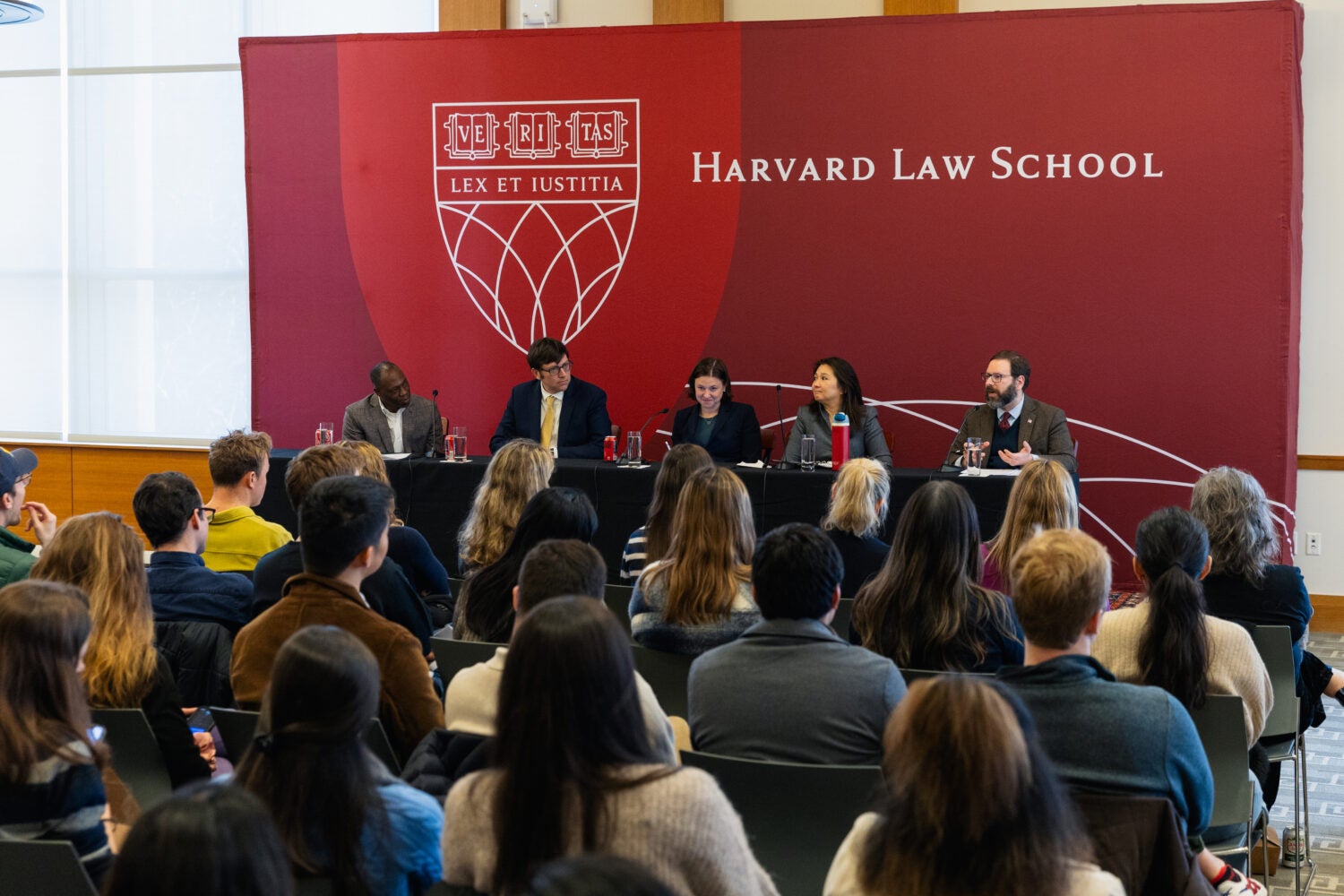The U.S. is probably not in a constitutional crisis — at least, not yet, according to a group of experts at a Harvard Law School event on Wednesday.
“We seem as a culture to have lost our ability to talk about our disagreements with outrageous presidential policies and our strong feelings of judgment about their immorality without channeling it into the language of illegality, unlawfulness, unconstitutionality, and then at the extreme, ‘constitutional crisis,’” said Jeannie Suk Gersen ’02, the John H. Watson, Jr. Professor of Law.
Gersen was speaking at the inaugural panel in a series at Harvard Law dedicated to analyzing the first 100 days of President Donald Trump’s second term, specifically the role the courts are likely to play over the next four years. What is the role of the judiciary in a democracy? And how is power in the U.S. shifting?
Moderator Guy-Uriel Charles, the Charles Ogletree, Jr. Professor of Law, began by describing what he called the administration’s “shock and awe” approach to governing – a flurry of activity that has included dozens of executive orders, pardons, and efforts to alter or eliminate executive agencies.
“Are we entering a period of constitutional democratic crisis?” Charles wondered.
Richard Re, the Ropes & Gray Visiting Professor of Law at Harvard and a faculty member at the University of Virginia School of Law, said it was useful to think about three aspects of democracy where the courts have a role.
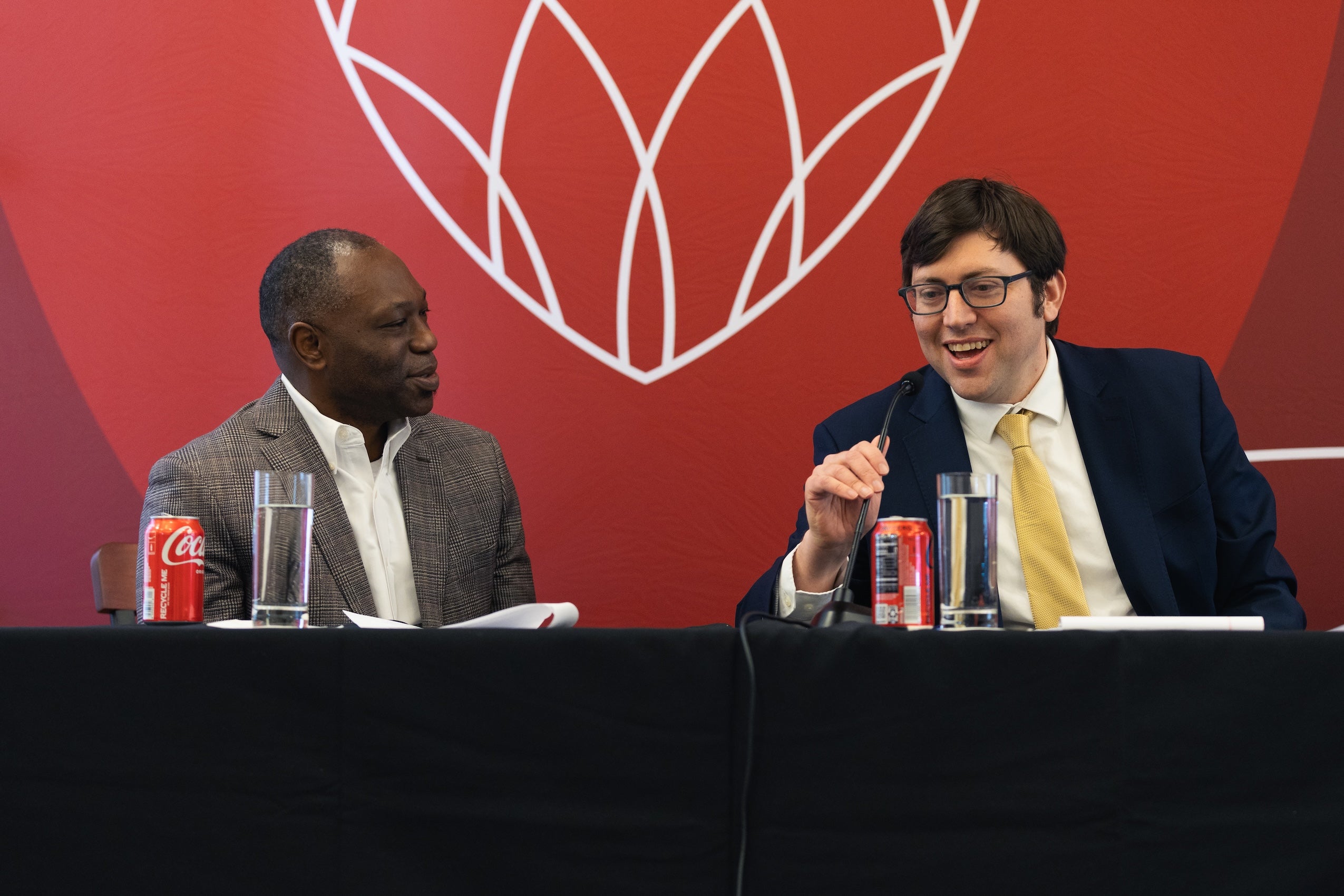
First, there is the rule of law, “the democracy that generated the Constitution” and various laws and statutes. “The role of the courts with respect to that aspect of democracy, you might say, is to make sure that those democratic enactments are adhered to in some contexts of legal dispute,” Re said.
Then there is the democracy that elected the president and a “sympathetic” Congress, he continued. “Elections matter, and have consequences,” he said. “And part of what the courts have to do is integrate that newer form of democratic action with the older rule of law enactments, combining legislation with executive discretion … In that sense, the court will mediate the harmonization of those two things or try to.”
Lastly, Re said, there is day-to-day public opinion. “I think that the courts are already playing a big role in that domain as well, not just by slowing things down, but by providing a vehicle for lots of information to be revealed about what is in fact happening with funding, what is happening in these agencies, what legal authorities do certain people actually have, or only purport to have.”
But the relationship between courts and other branches is not one directional, Re said, describing a growing interest by some to limit federal judicial tenure through various methods. “When we think about the federal courts either facilitating or synthesizing law, they’re checking, but they’re also potentially being checked, and that’s part of the mutual relationship that’s being fleshed out right now.”
According to Ruth Greenwood, an assistant clinical professor and director of Harvard Law School’s Election Law Clinic, there is not yet a constitutional crisis – but it will take the cooperation of all branches of government to keep it that way.
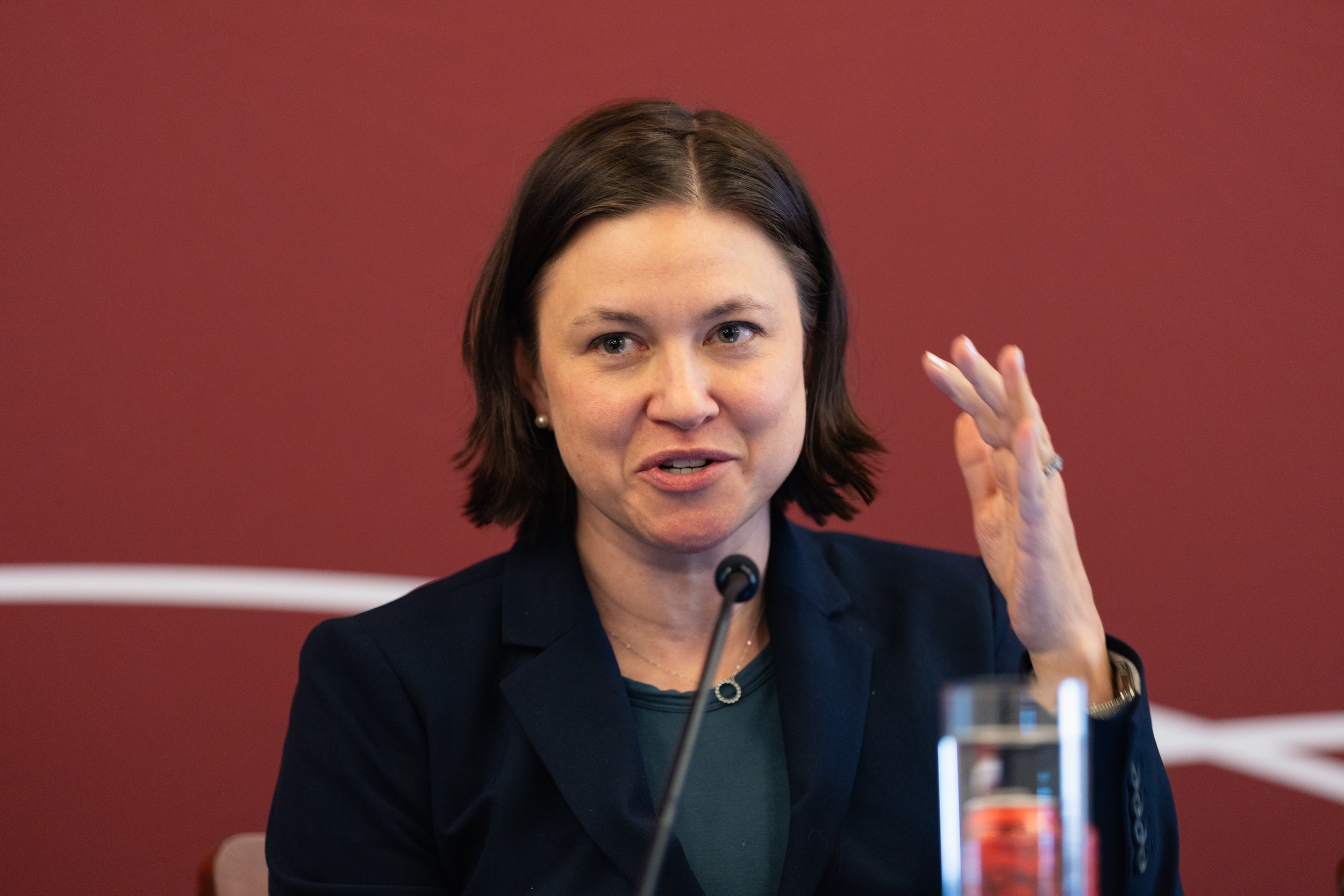
“I am about long-term structural change,” she said. “I think you only start calling something a constitutional crisis if the Constitution is not equipped to handle what is happening. The founders didn’t want a king. It doesn’t matter how many times you tweet or [post on] Truth Social about it. They set up three branches of government.”
So, far, she continued, Congress has mostly acquiesced to the administration, and the courts are just now beginning to weigh in. But Greenwood said that she hoped that those branches would eventually operate as designed – to be a check on their peers. “My hope, in the longer-term sense, is that that will continue, and it has [done so] through various historical crises.”
“I want it to be that you set up these mechanisms to keep democracy functioning, no matter who is running in and winning elections. I need the elections to keep going.”
Ruth Greenwood
Yet, Greenwood said she has found some of the Trump administration’s actions deeply troubling, such as those targeting the Federal Election Commission and other agencies that work to ensure free and fair elections. “I want it to be that you set up these mechanisms to keep democracy functioning, no matter who is running in and winning elections. I need the elections to keep going.”
She also decried what she described as a lack of transparency about the activities of DOGE, also known as the Department of Government Efficiency, an Elon Musk-led initiative aimed at reducing federal spending. “We need to be able to shine a light on the things that are happening, see what’s happening, talk about it and criticize it, and have public discourse.”
Gersen, a constitutional law scholar, had a word of warning for well-meaning lawyers and others who are convinced that a constitutional crisis is already happening or is inevitable. Employing phrases like “constitutional crisis” without sufficient caution or knowledge of law and facts involved in the various cases, she suggested, could help foster a confrontation where there isn’t one yet. “As people who care about the rule of law, I think that we need to think about our own participation in hastening its demise.”
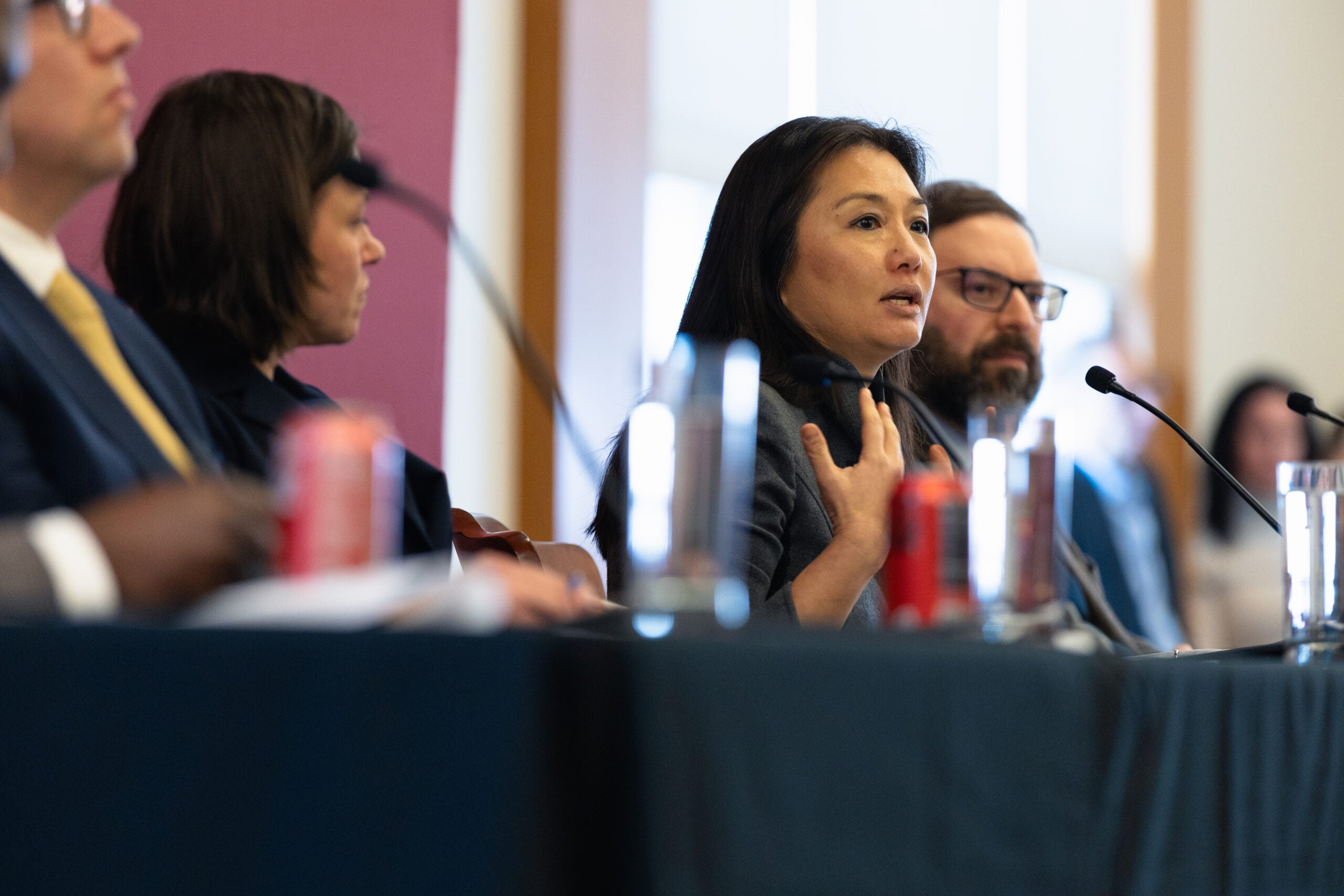
“As people who care about the rule of law, I think that we need to think about our own participation in hastening its demise.”
Jeannie Suk Gersen
Gersen also cautioned against putting too much faith in the courts alone. Already, dozens of lawsuits have been filed challenging initiatives such as changes to birthright citizenship, she noted. But to the president, winning or losing in court is sometimes beside the point, said Gersen, recalling Trump’s unsuccessful lawsuits challenging the 2020 election and how they nonetheless furthered his narrative of voter fraud.
“Potential lawsuits might loom as threats for a lot of people, but for Donald Trump, it’s more of a way of life,” she said, noting that he has faced hundreds of lawsuits as a businessman and a political figure. “As a way of life, it is less about winning on the legal merits and more about using the courts as a tool to tell a story in a bigger democratic sense.”
Gersen pointed to speculation around whether the administration will eventually abide by the courts’ decisions in these cases. “Has he said he’s going to disobey? He has not. I do not read his comments to mean he’s not going to obey. But there have been statements by the vice president and other members of his administration that have been taken to create this suspense: will he or won’t he?”
Gersen advised that opponents think carefully before amplifying these concerns. “We’re now routinely talking as if it is a choice for the president to decide whether or not to obey a direct court order,” she said.
Ironically, this approach could both erode faith in the system and further the administration’s agenda, Gersen suggested. “If [the president] loses on the legal issue, he loses, but we have already normalized the idea that the legal system is broken anyway.”
“There is often a statement made, in contentious times, ‘This is what democracy looks like.’ And I think that that may, in fact, be the case.”
Stephen Sachs
And if he wins some of the cases – which he likely will, Gersen added – those who dismiss the victories as evidence of the demise of the rule of law unwittingly empower those who wish it gone. “In terms of democratic participation, there’s a lot we can do to hasten the move toward anti-democratic and pro-authoritarian types of forces in our society,” she said. “I would just say maybe we shouldn’t do that.”
To Stephen Sachs, the Antonin Scalia Professor of Law, the current administration – and the reactions to it – are simply manifestations of self-government. “There is often a statement made, in contentious times, ‘This is what democracy looks like.’ And I think that that may, in fact, be the case.”
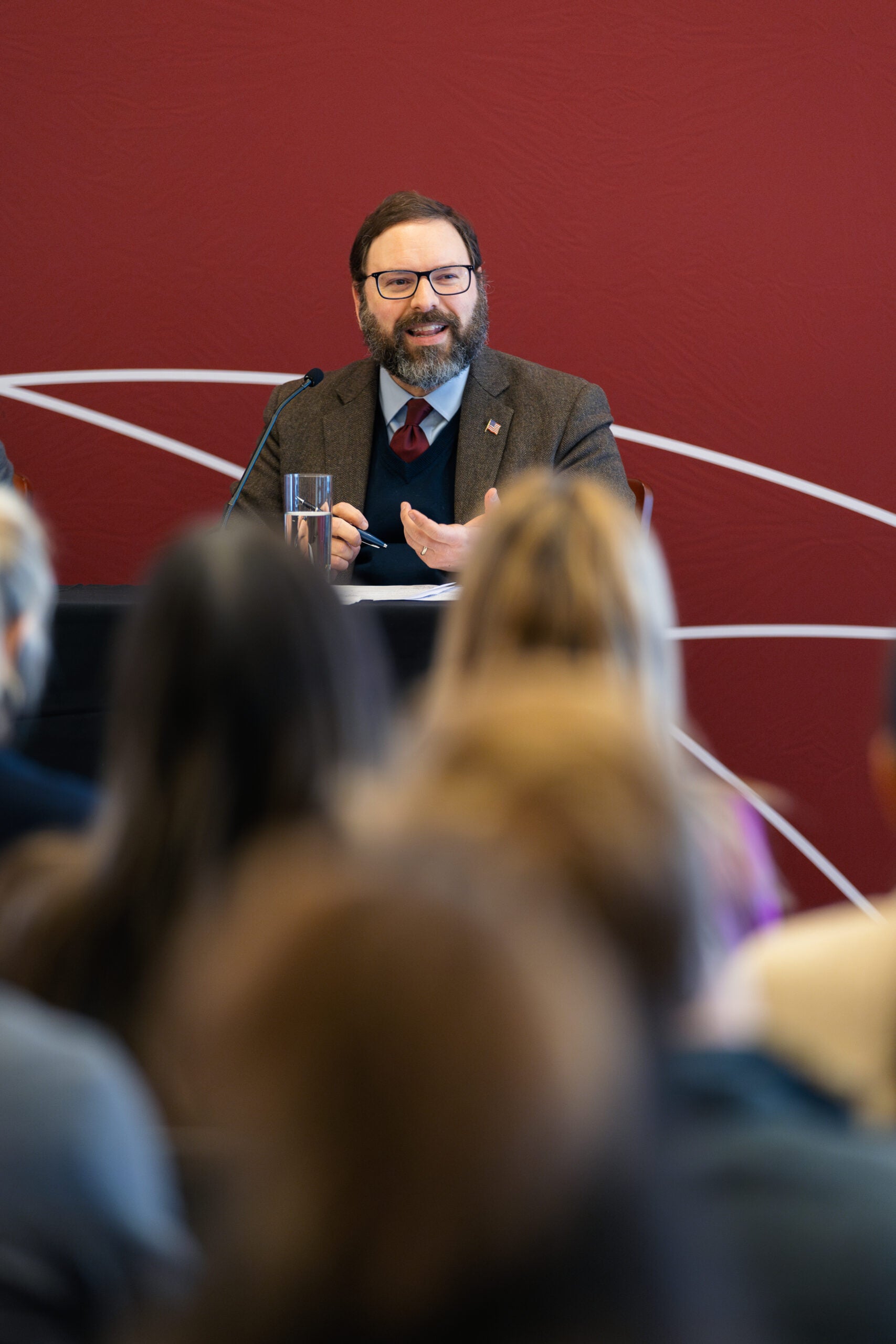
Which is not to say that the system is functioning as it should. Instead, Sachs said, “energy in the executive” is being “accentuated by a really stark failure of the legislature.”
“One of the ways that our system tries to preserve liberty is by making it hard for any one entity to claim the banner of the tribune of the people, because there’s a bunch of folks who are all elected … who can all, in some sense, claim a mandate,” he said. “And the hope is that they’re all fighting each other, and that ambition counteracts ambition, and it becomes harder when one branch or more has its hands tied behind its back.”
In his view, many of the administration’s most controversial actions fit within three categories. The first are actions that are clearly within the president’s constitutional authority, but which are the subject of heated policy disagreements, said Sachs, such as the firing of the chairman of the Joint Chiefs of Staff. The next bucket, he said, includes existing presidential powers that some observers worry the administration may be wielding for ideological or personal ends.
“Then, there are actions that are not obviously within the administration’s power, but are ordinary separation of power disputes, or ordinary constitutional disputes, even if they’re extremely aggressive,” he said.
These include the president’s challenge to the Supreme Court’s holding in Humphrey’s Executor v. United States (1935), which limited the chief executive’s ability to fire officials at independent agencies, such as the Securities and Exchange Commission.
Sachs believes that President Trump’s executive order on birthright citizenship might also fall into this third category.
“Though it’s much, much more aggressive as a matter of constitutional interpretation, it is within the zone of, ‘This is a legal view taken by the president about what the Constitution means, and it will get litigated, and normal things will happen.’ Even if we think the position itself is extremely aggressive compared to past White House positions,” he said.
Charles followed up with a question about how well the system of checks and balances was working. “Fundamentally, it seems that the framework that undergirds our constitutional democracy has broken down into not just partisanship, but also populism,” he said.
Gersen said that the Supreme Court may delineate, in the coming months and years, the lines separating the government’s powers among the three branches. But, she warned, “What we might find out at the end is that [the answer] is not to our liking,” she said.
She urged advocates to think about additional approaches beyond challenging the administration’s actions in court. “It’s not the case that if it’s not illegal or unconstitutional, that it automatically means it’s right, and that’s what I think is problematic in the way we talk about it. Once the court says it’s not illegal or unconstitutional, the air has gone out of the balloon, because we’ve lost our ability to really object, because we put all our eggs in the unconstitutionality basket, and we don’t have a basket left.”
In response to Charles’s question about separation of powers, Sachs said that he believed that much of the issue could be blamed on “our inability to legislate,” citing the U.S. Senate rule that requires a 60-vote supermajority for most legislation to pass. The Senate filibuster has forced presidents to rely on vaguely worded statutes, executive orders, and the administrative states to get anything done.
“The fact that we’ve got a filibuster, the fact that the filibuster is insuperable in many cases, means that we get very aggressive executive action, because if you’re trying to do one thing or the other, you have to spin out some story for why what Congress has already enacted allows you to do this,” he said. “It also encourages Congress, when it does act, to pass very broad statutes empowering the executive, because it knows it’s not going to be able to come back and revise them later, given the filibuster.”
Charles closed the discussion by asking the panelists about the advice they would give the students in the audience, regardless of political ideology, in thinking about their roles moving forward.
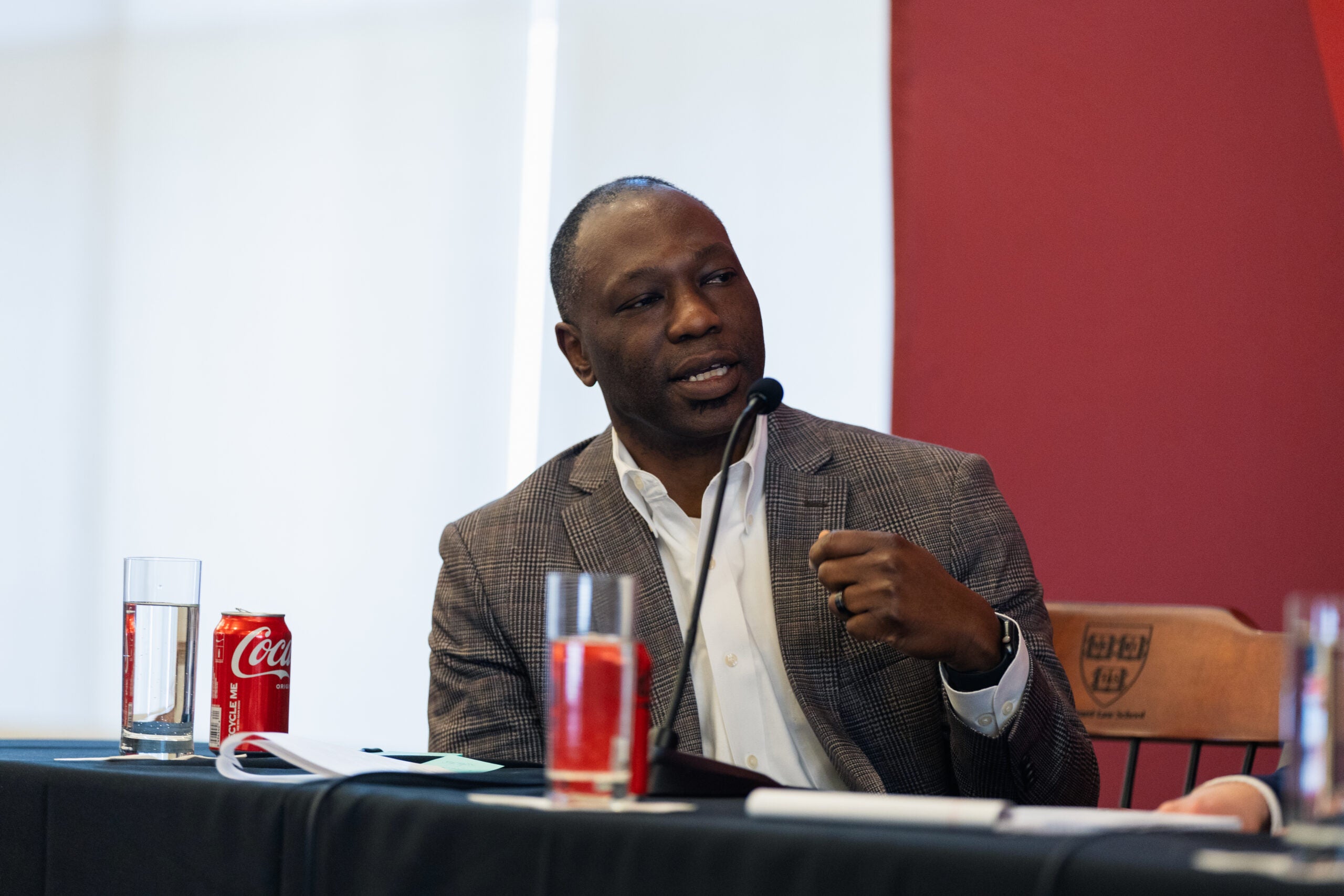
Re expressed optimism that the Supreme Court could “play a productive role in facilitating democracy and in preserving the rule of law.” But, he continued, “That framing makes clear that the main work, the critical work, is not in the courts … It is on the democracy side.” By taking full advantage of their time in law school to better understand law and the legal system, students can help fulfill that role.
“The main work, the critical work, is not in the courts … It is on the democracy side.”
Richard Re
Greenwood said that, regardless of one’s career plans, everyone can become engaged in their own communities. “Getting involved and seeing how compromises get made, the ugly business of local government … can be a way for you to think about the broader concept of, ‘big-D American democracy.”
“I came from a different country,” noted Greenwood, who was born in Australia. “You guys [in the U.S.] have gone up and down and all over the place – it’ll keep going. And you are the people who are going to help it keep going.”
The First 100 Days of the Second Trump Presidency is a series of Harvard Law School faculty panels exploring important questions of domestic and international law raised by the administration’s initial efforts to implement its agenda.
Want to stay up to date with Harvard Law Today? Sign up for our weekly newsletter.
